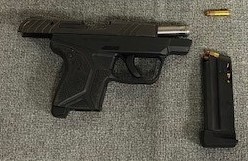 A gun intercepted by the TSA recently at Jacksonville International Airport (TSA photo)
A gun intercepted by the TSA recently at Jacksonville International Airport (TSA photo)
A man headed for Seattle came to a Transportation Security Administration (TSA) checkpoint at Tampa International Airport with a Bersa Thunder semi-automatic pistol. The weapon was loaded with six rounds; one bullet was chambered. A woman headed for Atlantic City entered the St. Pete-Clearwater International Airport security checkpoint with both a Sig Sauer and a Glock in her backpack. Another woman entered the Jacksonville International Airport checkpoint with a gate pass to meet a minor and in her purse was a Ruger semi-automatic. That weapon was also loaded with a bullet chambered.
TSA officers stopped each of them. “Whether or not they had nefarious intent, accidents happen and tragedies could result,” said TSA spokesperson Sari Koshetz. “This dangerous trend continues across Florida and across the country. Know exactly where your gun is before you enter the airport and make sure that it is not in your backpack, purse, computer bag or suitcase that you plan to bring into the security checkpoint.”
Also during recent days: on Thursday a woman with a Sig Sauer loaded with six rounds, one of them chambered, entered a Miami International Airport TSA checkpoint. She left without her gun and with a notice to appear in court. On Friday a male with a Taurus 9mm loaded with 12 rounds was stopped by the TSA and arrested by the Orlando Police Department at Orlando International Airport. On Monday a man carrying a Beretta into Ft. Lauderdale-Hollywood International Airport was intercepted by the TSA and while he was not arrested, he will lose his TSA PreCheck privileges and he faces a fine that could exceed $13,000.
The list goes on: 195 guns long for the year-to-date in Florida. Topping the list of guns are Orlando International (MCO) at 40; Ft. Lauderdale-Hollywood International (FLL) at 36; Tampa International (TPA) at 26; Miami International (MIA) at 19 and Jacksonville International (JAX) at 17.
Passengers face a civil penalty from the TSA that can reach as much as $13,910 and that is imposed regardless of whether the individual is arrested by our law enforcement partners. If the traveler is in the TSA PreCheck® program, those privileges will be lost for a period of time, possibly permanently.
Every year FLL, TPA and MCO are typically in the top 10 or 11 airports across the country for passengers violating federal law by bringing guns to the TSA checkpoints.
Here are six tips for getting through the TSA checkpoint as quickly and efficiently as possible.
Tip 1: No guns in carry-ons. Airline passengers can fly with firearms only in checked baggage. All firearms must be properly packed and declared at check-in, which means unloaded and in a locked, hard-sided case. Contact your airline for additional guidance. And it is your responsibility to know what the gun laws are on both sides of your trip because guns may not be legal to transport even in checked baggage in some jurisdictions.
Tip 2: Wear a face mask. You must. The federal face mask mandate for travelers remains in place for any location inside an airport or on a plane. Those who refuse to wear a mask face steep fines from the TSA.
Tip 3: Leave all prohibited items at home. To reduce the likelihood of a bag search at the checkpoint, search your own bag before leaving home. Unsure if it’s allowed: use the “What Can I Bring?” page on TSA.gov.
Tip 4: Prepare for the security checkpoint. Have a valid ID card readily available. Follow the liquids rule of 3.4 ounces or less, with the exception of hand sanitizer, which has a temporary 12-ounce limit in carry-on baggage. Empty your pockets into your carry-on rather than into a bin.
Tip 5: Help is available. Get live assistance by tweeting your questions and comments to @AskTSA in English or Spanish or via Facebook Messenger. You can also call the TSA Contact Center at 866-289-9673.
Tip 6: Enroll now in TSA PreCheck®. Travel with Ease by enrolling in TSA PreCheck and avoid removing shoes, belts, liquids, food, laptops and light jackets. Most new enrollees receive a known traveler number within five days, and membership lasts for five years.
